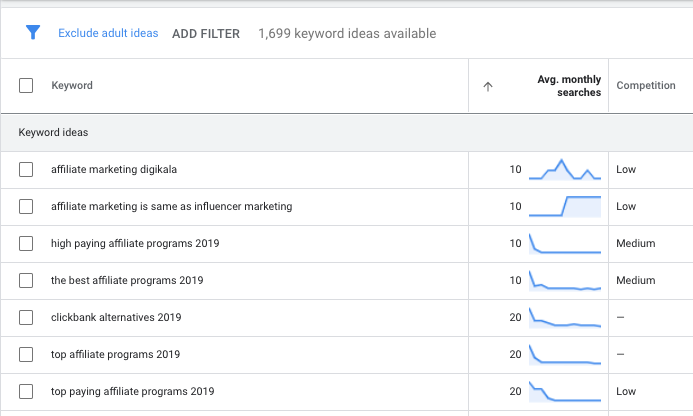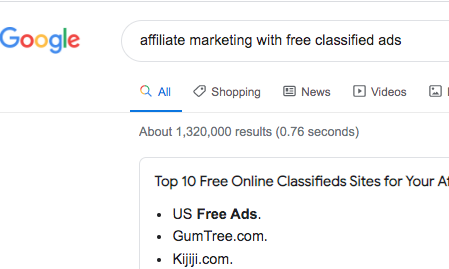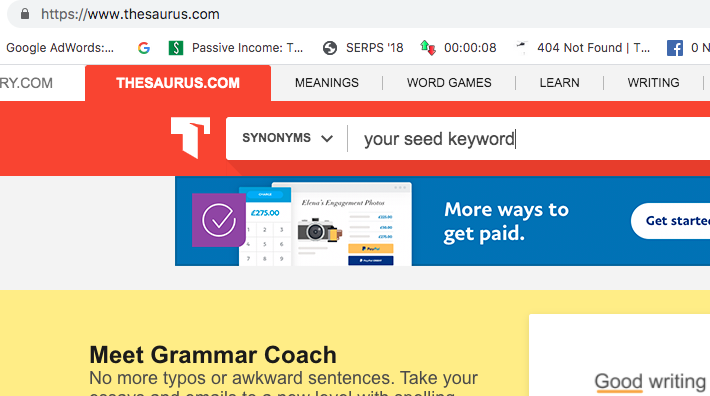Back in the early 2000’s I found an “affiliate loophole” which let me get free traffic from Google. It worked some of the time so I decided to build my blogging strategy around it. It’s based on a course I did by a guy called George Brown called Google Sniper. Google Sniper taught to find keyword targeted domain names in uncompetitive niches.

I successfully built several websites using this strategy which went on to rank for their keywords on the first page (and often the top) of the Google search engine. The main problem was as Google updates came out, (Penguin and Panda), small spammy websites were kicked off the top of Google. Back in the early 2000’s it was so much easier to rank a site than it is now. Back then, you could own a three page website and it would rank at the top for your chosen keywords.
Still, I persevered with the strategy and managed to pick up free traffic from Google, Bing, Yahoo and Duckduckgo.
Affiliate Loophole – Identify Low Competition Keywords
The first step of this “affiliate loophole” is to identify long tail, low competition keywords. You simply won’t be able to compete with the more competitive keywords. In the affiliate marketing niche, it’s also very competitive, so I knew I had my work cut out. But in a less competitive niche, It’ll be much easier to get free traffic.
But you need to weigh up the relative competition and your monetisation strategy. In some low competition niches, it’s much harder to monetise, even with traffic.
There’s lots of tools for doing keyword research available to buy. But I’ve always just stuck with Google’s free keyword planner. You can start by typing in your “seed” keyword into the keyword planner. With this site, for instance, it’s going to be affiliate marketing, or some derivative of it.

As you can see, there’s a huge amount of traffic for the major keywords in this niche. But rather than aim for the competitive keywords which get a lot of traffic, we’re going to find the less competitive ones which have less traffic, but less competition. We want the “low hanging fruit” keywords which we can rank articles for.
Strategies To Find Long Tail, Uncompetitive Keywords
One simple strategy is to look for the keywords which get searched for less. To do this we can click on the box with “Av. Monthly Searches” in it – the average monthly search traffic. Click on it until you get the keywords which offer less traffic. Although this might seem counter intuitive, it’s far better to rank for keywords which only get a few searches every month, than never rank for the ones which get thousands of monthly searches.

You can then scroll through pages of longer tail keywords, until you find a suitable keyword you can create content for. Ideally, you want to find keywords which relate to your product or service, which you can potentially rank for. You also want buyer traffic, which means you need to think about the intent behind each search.
Comparing Keywords On Google
Although there’s other search engines which will index your content, Google is the most widely used. Some of your content may not rank on Google, but it might rank on other search engines. But if you create some quality content, with a long term focus, you’re more likely to rank on more of the search engines. Aim for Google rankings though because they are the toughest to rank for. Some of your content might not make it, but they could pick up free search traffic from other engines like Bing, Yahoo and Duckduckgo for example.
Once you’ve found a search term you would like to create some content for, head over to Google to see how competitive your search term is.

Type your keyword into the Google search bar and look for the number which comes up underneath it. You’ll need to be on a desktop computer or laptop in order to see this. I doesn’t work on a mobile phone. As you can see in the picture above, the number is 1,320,000. This is the number of competing pages for this search term. You want to find those with a number of less than 10,000,000 (10 million) ideally. Once you’ve done this, try the search again with quotes around it. This will give you an idea of the number of competing pages with this term specifically.

What we’re doing here is looking for the long tail keywords which relate to your website, and which offer the least competition. This is more art than science, but it gives you a general idea about the relative competition for the keywords which you want to get found for.
Affiliate Traffic Loophole
This process will take some time to get good at. But the more you do it, the more you’ll be able to identify long tail keywords and obscure keywords which are less competitive and which you can rank your content for. Once you have identified a specific keyword which you would like to create content around, you can get started writing.

You can also create videos using the same keyword and upload them to YouTube. Ideally you would do both: a blog post and a video for maximum effect. I use an SEO plugin (Yoast SEO) to help me write my articles. You can also check out the content which ranks the highest on Google for your keyword and write a better article than the best performing post.
Another way to use the keyword planner is to simply type obscure keyword combinations into it. Look for keywords which contain your “seed keyword” and other variations of it. This article, for example, uses the keywords “affiliate loophole”. It’s a short keyword but the term loophole has fewer competing pages than most in the affiliate niche.
Another tool I sometimes use is the online thesaurus. This tool can give you a number of keyword terms which relate to your niche, but which are also less competitive than the others.

Summary
This little strategy has helped me generate free traffic to my websites for some time. There’s another loopholes to affiliate marketing which I share in my article: affiliate marketing loophole, too.
As an affiliate you have to remember also that something like 90% of your online efforts won’t actually produce the result you’re after. But if you get stuck into a strategy, you’ll see over time than some of it works and some doesn’t. This little strategy is definitely a long term one. Be prepared for some to hit and others to miss. But if you stick at it for the long term, you should see some results. I have thousands of articles on various websites. Most of them don’t get the traction I really want them to. But some of them get me traffic, leads and sales.
Some niches are also much more competitive than others. So if you’re lucky enough to be in a less competitive niche than affiliate marketing, (which isn’t hard), you’re more likely to succeed with this strategy.